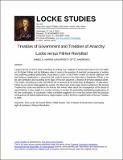Files in this item
Treatises of government and treatises of anarchy : Locke versus Filmer revisited
Item metadata
| dc.contributor.author | Harris, James A. | |
| dc.date.accessioned | 2020-01-20T15:30:08Z | |
| dc.date.available | 2020-01-20T15:30:08Z | |
| dc.date.issued | 2020-01-17 | |
| dc.identifier | 261213455 | |
| dc.identifier | 41865c7b-c61d-4179-afdb-c33a7050dc59 | |
| dc.identifier.citation | Harris , J A 2020 , ' Treatises of government and treatises of anarchy : Locke versus Filmer revisited ' , Locke Studies , vol. 19 , pp. 1-32 . https://doi.org/10.5206/ls.2019.8185 | en |
| dc.identifier.issn | 2561-925X | |
| dc.identifier.other | ORCID: /0000-0002-0333-3754/work/69029206 | |
| dc.identifier.uri | https://hdl.handle.net/10023/19316 | |
| dc.description.abstract | I argue that one of John Locke's intentions in writing Two Treatises of Government was to turn the tables on Sir Robert Filmer and his followers when it came to the question of practical consequences of writing and publishing political philosophy. According to Locke, it was Filmer's thesis of natural subjection that had seditious ramifications. The doctrine of natural liberty and equality, by contrast, was no threat to the peace and order of a well-governed state. I show first that Locke is correct in his claim that in Patriarcha Filmer is, by his own admission and according to the logic of his own argument, a theorist of de factopolitical power. This meant, according to Locke, that Filmer has no account of the moral basis of allegiance. To that extent, Filmer has no case to make against the usurper. On other hand, I then argue, there is evidence in the Second Treatise that Locke was attuned to the worries that Filmer raises about the consequences of the thesis of natural liberty. Locke sought, in a number of ways, to contain the potentially destabilizing implications of his own conclusions. In conclusion I make a tentative suggestion as to how this concern with the practical consequences of flawed political theory might explain Locke's decision to publish both of the two Treatises in 1689. | |
| dc.format.extent | 32 | |
| dc.format.extent | 279618 | |
| dc.language.iso | eng | |
| dc.relation.ispartof | Locke Studies | en |
| dc.subject | John Locke | en |
| dc.subject | Sir Robert Filmer | en |
| dc.subject | Philip Hunton | en |
| dc.subject | Two treatises of government | en |
| dc.subject | Sovereignty | en |
| dc.subject | Right of resistance | en |
| dc.subject | Glorious Revolution | en |
| dc.subject | B Philosophy (General) | en |
| dc.subject | T-NDAS | en |
| dc.subject | BDC | en |
| dc.subject | R2C | en |
| dc.subject.lcc | B1 | en |
| dc.title | Treatises of government and treatises of anarchy : Locke versus Filmer revisited | en |
| dc.type | Journal article | en |
| dc.contributor.institution | University of St Andrews. Philosophy | en |
| dc.contributor.institution | University of St Andrews. Institute of Legal and Constitutional Research | en |
| dc.contributor.institution | University of St Andrews. Centre for Global Law and Governance | en |
| dc.identifier.doi | https://doi.org/10.5206/ls.2019.8185 | |
| dc.description.status | Peer reviewed | en |
| dc.date.embargoedUntil | 2020-01-17 |
This item appears in the following Collection(s)
Items in the St Andrews Research Repository are protected by copyright, with all rights reserved, unless otherwise indicated.

